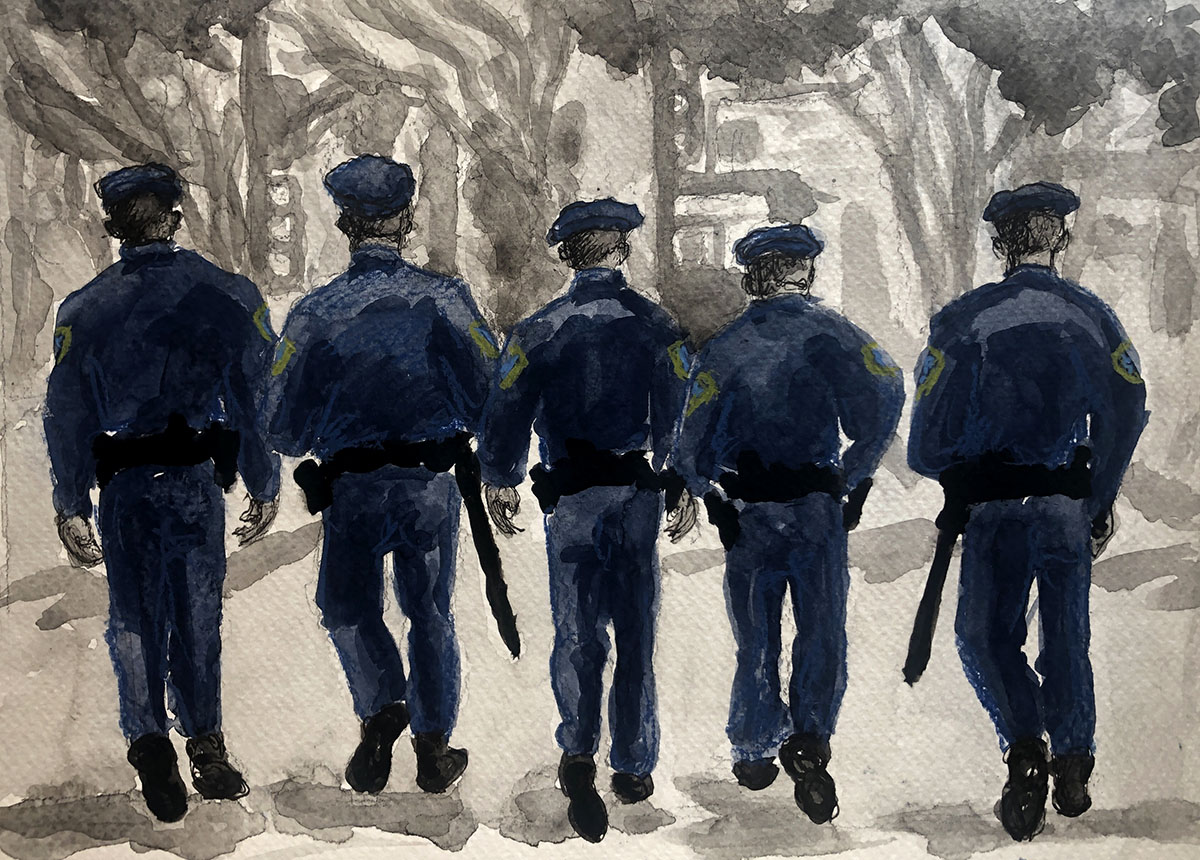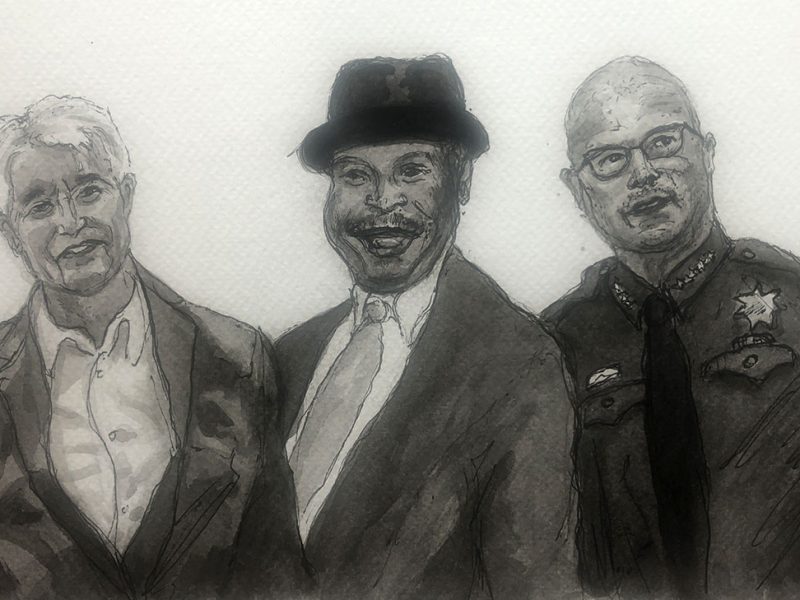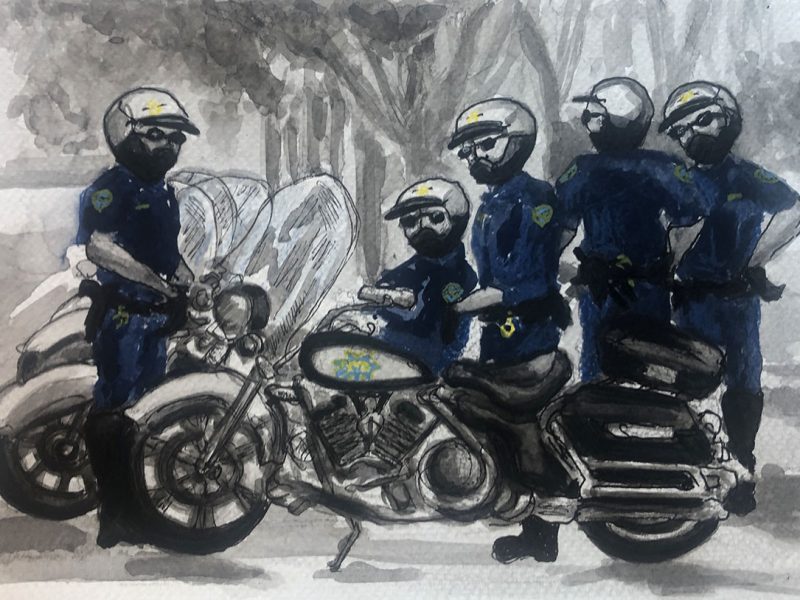Police officers and sheriff’s deputies are almost never charged in criminal court. But when it comes to civil litigation, business is booming.
From 2010 to May 2023, San Francisco settled some 1,750 lawsuits involving police officers, deputies, and other law enforcement staff. That works out to roughly one settlement every three days.
The cost to taxpayers: Roughly $70 million. Plus legal fees.
Many of these settlements were small and involved issues like traffic collisions or damaged property. But a Mission Local analysis of data from the City Attorney’s Office, supervisorial records, and federal and local court documents found at least 140 settlements since 2010 with payouts that exceeded $25,000.
They encompass a veritable panoply of alleged misconduct, including police shootings, a reported county jail “fight club,” cops fired for whistleblowing, and scores of clashes that resulted in broken bones.
Since 2010, 10 deaths have led to a combined $12.1 million in payouts from San Francisco coffers to the victims’ surviving kin. An additional $26.6 million has been paid out to just four individuals who were wrongly imprisoned for a combined 57 years.
You can explore all of these major law enforcement-related settlements using the interactive database below.
Each circle represents a settlement, and its size reflects the size of the payout. Click each circle for case details, and use the buttons to sort the data in different ways; you can search for the number of settlements paid out by the police department, for instance, or those involving excessive force. Use the search bar to search for specific plaintiffs, officers, or case details.
Note: Descriptions are primarily drawn from plaintiff’s complaints. Many events are disputed.
Payout breakdown
After payouts for wrongful deaths and false imprisonments, some of the largest payments came from officers or sheriff’s deputies filing successful employment disputes.
For example, one class-action lawsuit filed by nine officers alleged discrimination against disabled employees over access to a pension scheme; it ended up costing the city $1.3 million. Another suit concerning unpaid overtime for sheriff’s deputies yielded a similar amount.
A not-inconsiderable subset of these employment lawsuits involved officers who were allegedly punished for reporting their colleagues’ wrongdoing.
Chief Greg Suhr, who was forced to resign in 2016 after more than 30 years on the police force, was at the center of two major settlements. Police lawyer Kelly O’Haire was awarded $725,000 in 2015 after being fired by Suhr, whom she had accused of failing to report domestic violence. Suhr allegedly pressured officer Patricia Burley to resign after she blew the whistle on a fellow officer who had embezzled funds. She won $100,000 in 2018.
And officer Kevin Lee won $35,000 last year after he was allegedly passed over for promotions when he reported two colleagues for falsifying an accident report in 2013.
The Sheriff’s Office also saw its fair share of settlements: Some 13 detainees won $425,000 in 2013 over allegations that deputies were stripping inmates and placing them in a so-called “cold room” to “compel consent” for searches. While typically major cases took about two years to resolve, this one stretched out for 10 years, the longest of any in our database.
Other successful suits against the Sheriff’s Office included allegations of detainees forced to fight one another for food, consistently overflowing toilets, and inadequate medical attention, leading to injury and death.
Among smaller settlements, which are not captured in the graphic above, allegations were often less dramatic but could still be costly.
Just shy of half of all payouts were due to vehicle collisions. The typical payment hovered around $2,400, and law enforcement vehicle collisions have cost the city at least $8.7 million in settlement costs since 2010. Property damage and loss were also common, making up about 32 percent of cases and resulting in a typical settlement of around $520.

Wrongful death and imprisonment are
uncommon but cost the city dearly.
Number of settlements
Cost of settlements
$8.7M
$900K
$4M
$6.1M
Hit by vehicle
844
$8.7M
$28.8M
Property loss
562
Wrongful
detainment
Other
122
101
Force
$12.1M
Wrongful
death
76
Employment
39
10

Wrongful death and
imprisonment are uncommon
but cost the city dearly.
Number of
settlements
Cost of
settlements
$8.7M
$900K
$4M
$6.1M
844
Hit by vehicle
$8.7M
$28.8M
Property
loss
562
Wrongful
detainment
Other
122
101
Force
$12.1M
Wrongful
death
76
Employment
39
10
Chart by Will Jarrett. Data from the City Attorney’s Office.
“The settlement money is a fraction of the total cost to the city,” said Brian Cox, an attorney in the Integrity Unit of the Public Defender’s Office. The Integrity Unit attempts to keep tabs on officer misconduct, in case their histories become relevant when defending a suspect at trial.
He said that the time spent by lawyers in the City Attorney’s office fighting these cases can be even more expensive than the settlements themselves. And officers involved in lots of civil suits and misconduct cases become less valuable to the city, Cox added, because their testimony can more readily be called into question. Such officers are sometimes put in non-public-facing roles for years — while still pulling down full salaries.
Settlements are “the tip of the iceberg,” said Cox.
Criminal charges
While there have been many civil settlements over the past 13 years, officers and deputies have largely avoided the criminal courts.
On the one hand, it is not unexpected to see civil suits crop up much more frequently. The burden of proof is lower in civil court, requiring a preponderance of evidence instead of the “beyond a reasonable doubt” standard in criminal courts. The city may also choose to settle without going to court at all, for public relations reasons or to avoid the expense of defending itself. Plus, city settlements almost never include an admission of guilt.
But the gulf between the civil and criminal outcomes for law enforcement is still striking. Since 2010, the city has settled more than 100 cases involving excessive or unlawful force. On-duty criminal assault charges brought an officer to trial just once, when Officer Terrance Stangel was charged for the beating of Dacari Spiers in 2017. The city ultimately paid out $700,000 to Spiers and $47,500 to his then-girlfriend, Breonna Richard, over the incident. In criminal court, Stangel was found not guilty.
Also since 2010, city law enforcement has been successfully sued for wrongful death at least 10 times. But no officer or deputy has ever been found guilty of on-duty homicide. Officers Chris Samayoa and Kenneth Cha were charged with manslaughter under former District Attorney Chesa Boudin. But District Attorney Brooke Jenkins dropped the case against Samayoa in May — after he was fired and the city settled a $2.5 million lawsuit with his family — and has slow-walked bringing Cha to trial.
It is difficult to know exactly how often police officers are charged with crimes. Randy Quezada, spokesperson for the District Attorney’s Office, said that it could not readily be determined how many criminal cases have historically been brought because “there is no internal tagging system for cases involving law-enforcement officer defendants.”
In the absence of criminal charges, the civil system can act as an imperfect way of “holding officers accountable,” said John Burris, an attorney who specializes in police misconduct cases. Roughly one in every seven successful major law-enforcement suits involved his firm, making it the city’s most popular for these kinds of cases.
“You hope it will send a message to the public officials,” said Burris. But, he added, although private law firms can secure compensation for victims and their families and can publicize instances of police misconduct, it ultimately falls to the city to punish wrongdoing.
“That is something the District Attorney is supposed to control,” said Burris. “And this District Attorney does not appear inclined to prosecute police officers.”
Methodology
Most of the data for this analysis came from the City Attorney’s Office. Other case details were scraped from supervisorial records, federal and local court documents, and files from the Public Defender’s Office.
A roster of current and former police officers was provided courtesy of the Community Law Enforcement Accountability Network, the EPIC Data Lab at UC Berkeley, and the California Reporting Project.
Major settlements were manually categorized into different types — for example, “excessive force” or “wrongful death” — while minor settlements were categorized using City Attorney labels. Non-monetary settlements were excluded.
Some settlements include legal fees, while others do not. The numbers reported here are as they were recorded by the Board of Supervisors and by the City Attorney’s office. Settlements from 2010 to the end of May 2023, should be included.
You can download the major settlements dataset here.





Burris came up empty for Alex Nieto’s family, and secured a paltry $400k for Mario Woods’ family. The lawyer for the family of Amilcar Perez-Lopez was coming off a multi-million dollar wrongful death settlement in LA when he negotiated a meager $275k settlement on their behalf.
I couldn’t figure out how SF was avoiding a 7-digit payout time and time again. Laquan McDonald, Tamir Rice, and Freddie Gray all failed to move the needle in SF, but then came the George Floyd protests. That is one of the great accomplishments of the BLM movement. Time to pay up, suckas.
Great data assimilation and layout here. This Will Jarrett guy is worth his weight in gold.